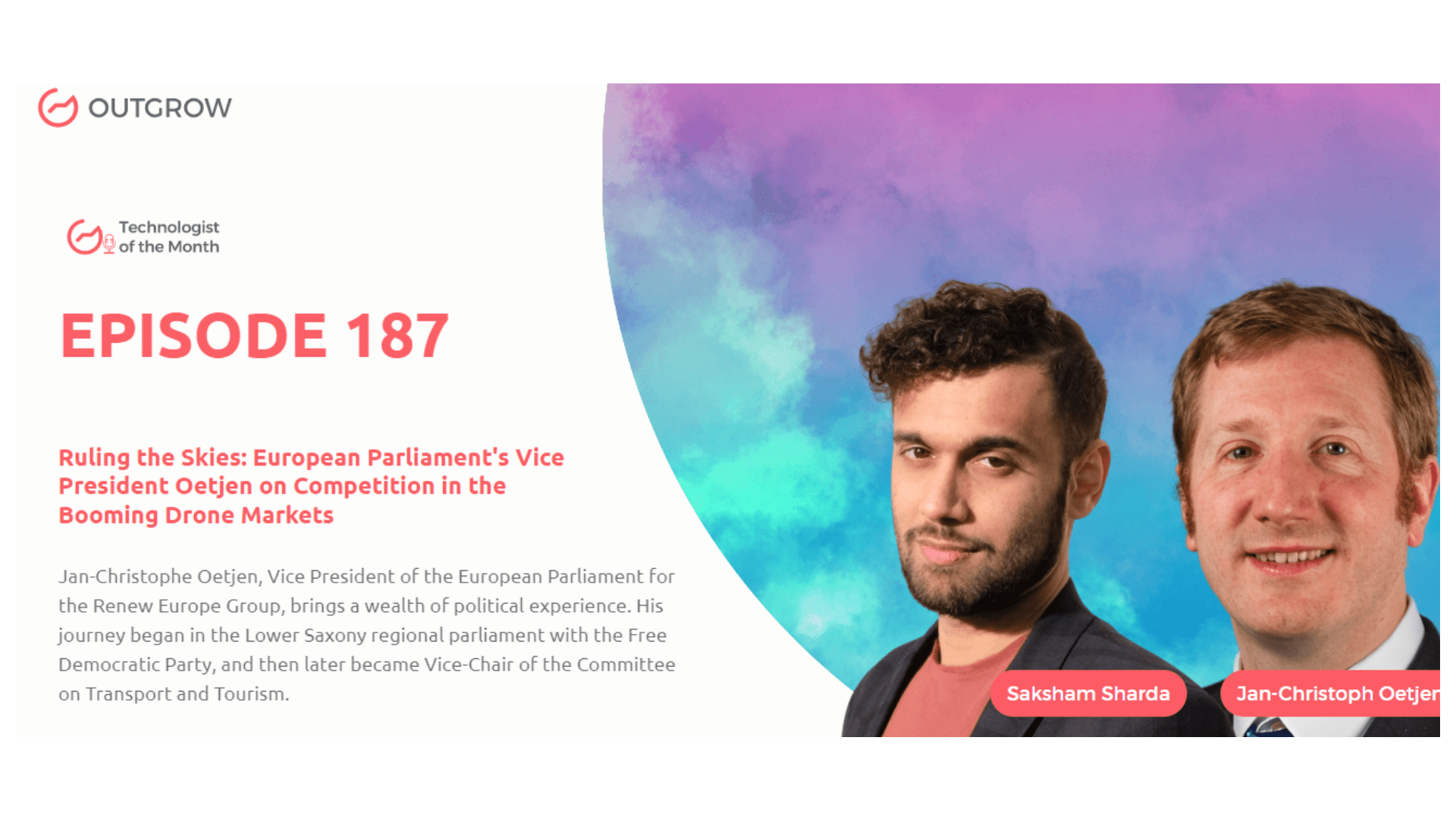EPISODE 187: Marketer of the Month Podcast with Jan-Christoph Oetjen
Table of Contents
Hey there! Welcome to the Marketer Of The Month blog!
We recently interviewed Jan-Christoph Oetjen for our monthly podcast – ‘Marketer of the Month’! We had some amazing insightful conversations with Jan-Christoph and here’s what we discussed about –
1. Importance of positive drone visibility and perception in society to combat negative associations.
2. Utilizing existing ecosystems and highlighting positive drone applications in agriculture and everyday life.
3. Challenges in adapting rules across diverse member states, facilitation efforts to share knowledge, and best practices.
4. Regulations on camera usage and privacy protection measures to prevent misuse and infringe on individual rights.
5. Focus on providing a flexible framework to accommodate rapid technological advancements while ensuring safety.
6. Collaborative efforts between public and private sectors to advance drone technology.
About our host:
Dr. Saksham Sharda is the Chief Information Officer at Outgrow.co. He specializes in data collection, analysis, filtering, and transfer by means of widgets and applets. Interactive, cultural, and trending widgets designed by him have been featured on TrendHunter, Alibaba, ProductHunt, New York Marketing Association, FactoryBerlin, Digimarcon Silicon Valley, and at The European Affiliate Summit.
About our guest:
Jan-Christophe Oetjen, Vice President of the European Parliament for the Renew Europe Group, brings a wealth of political experience. His journey began in the Lower Saxony regional parliament with the Free Democratic Party, and then later became Vice-Chair of the Committee on Transport and Tourism.
EPISODE 187: Ruling the Skies: European Parliament’s Vice President Oetjen on Competition in the Booming Drone Markets
The Intro!
Saksham Sharda: Hi, everyone. Welcome to another episode of Outgrow’s Marketer of the Month. I’m your host, Dr. Saksham Sharda, and I’m the creative director at Outgrow. co. And for this month we are going to interview Jan-Christoph Oetjen, Vice President of the European Parliament.
Jan-Christoph Oetjen: Great to be here. Thank you.
Don’t have time to read? No problem, just watch the Podcast!
Or you can just listen to it on Spotify!
The Rapid Fire Round!
Saksham Sharda: Alright, so the rapid fire round, the first one is, at what age do you want to retire?
Jan-Christoph Oetjen: I don’t know. 65, I guess.
Saksham Sharda: How long does it take you to get ready in the mornings?
Jan-Christoph Oetjen: 20 minutes.
Saksham Sharda: Favorite color?
Jan-Christoph Oetjen: Un Bois.
Saksham Sharda: What time of day are you most inspired?
Jan-Christoph Oetjen: In the morning.
Saksham Sharda: How many hours of sleep can you survive on?
Jan-Christoph Oetjen: I’ll pass that then.
Saksham Sharda: How do you relax?
Jan-Christoph Oetjen: Oh, reading and cooking.
Saksham Sharda: The city in which the best kiss of your life happened?
Jan-Christoph Oetjen: Paris.
Saksham Sharda: How many cups of coffee do you drink per day?
Jan-Christoph Oetjen: Five.
Saksham Sharda: A habit of yours that you hate.
Jan-Christoph Oetjen: Pass.
Saksham Sharda: The most valuable skill you’ve learned in life.
Jan-Christoph Oetjen: Being patient with people.
Saksham Sharda: One-word description of your leadership style.
Jan-Christoph Oetjen: Cooperative.
Saksham Sharda: Top priority in your daily schedule.
Jan-Christoph Oetjen: Getting things done.
Saksham Sharda: Ideal vacation spot for relaxation.
Jan-Christoph Oetjen: Small houses increase in the island.
Saksham Sharda: Key factor for maintaining a work-life balance.
Jan-Christoph Oetjen: Having clear.
Saksham Sharda: Memorable career milestone.
Jan-Christoph Oetjen: Being elected to the European Parliament in 2019.
The Big Questions!
Saksham Sharda: Alright, so that was the end of the rapid-fire round. Now we can go onto the longer questions, which you can answer with as much ease and time as you like. The first one is, how can societal acceptance of drones be increased.
Jan-Christoph Oetjen: I think it’s important that people see drones and they see the positive. For example, the drone I used, and this is very positive for society. There’s, see, they go there to see how the phones are rescued. So people need to see drones in operation. They need to see drones helping rescue their drones. So acceptance is only hearing about when you listen to the news and hear about the attacks during the war.
Saksham Sharda: And how can this awareness be increased?
Jan-Christoph Oetjen: I think we I think the awareness could be least we have a good ecosystem for our drone in, in Europe. We see farming and others that people need to talk about. So I think the awareness rising is present and this being popular and being part of everyday society.
Saksham Sharda: You’ve talked about the use of drones in Agriculture, but besides agriculture how does the EU envision the role of drones in critical public services such as healthcare and emergency response for instance?
Jan-Christoph Oetjen: Drones will have a very important role in response and rescue, especially on health issues. There may be delivery to remote areas, but we’ll see very soon that for example, the old helicopters from Germany will be replaced. So these are not small drones like, you know it, but they’re in a way a drone category. So this will be a part of the future of heavy services for people in the future.
Saksham Sharda: I can imagine that this kind of widespread implementation will certainly require infrastructure or policy changes at the European Level. What is the EU planning to do about that?
Jan-Christoph Oetjen: We have a big advantage in Europe. At the same time, a big problem is the industry that is emerging, that has not been existing before. The rules are very fragmented and what I wanna see is European services able to offer the same services in all countries at the same time. We have to make sure that those services can exist and game changer services are available, if this is too expensive, the service will not happen. So we need to make sure that the cost of those services is to make a drone infrastructure environment a reality in the future.
Saksham Sharda: And so the EU market is one thing, but in terms of international cooperation, how is the EU positioning itself as a leader in setting these global standards for drone operations and technology?
Jan-Christoph Oetjen: You have two different approaches. Have the American approach. They start to fly. There are not many rules. And then we see, they have a look at, okay, what they do, we need to, and as a European approach the European approach, we put rules on the services because the European lot safety first. So there’s nothing that is more so we are on the world continent where global operations are the most safe. We have a continent in the world. Standards are the highest procedures. The big advantage is that the company can operate safely, and securely, and can ensure that the rules that are there apply and important services. So I think that’s the real advantage of the European Union in drone aerospace.
Saksham Sharda: You mentioned how the US has a different style. How does the EU plan to address potential resistance or pushback from other countries in drone standard-setting efforts?
Jan-Christoph Oetjen: Well, we are the first in place. So those who build drones, comply with European standards because the European market is a big market. And so we export our standards to other parts of the world. And this brings safety to other parts of the world as well. So this is our way of doing things.
Saksham Sharda: Earlier you described how there’s diversity in the EU, which can be a positive and sometimes a little bit to work through. Can you describe the challenges the EU faces in harmonizing drone regulations across its different jurisdictions?
Jan-Christoph Oetjen: Well, we have the problem. There are rules that the member states have to adapt to, and this takes more or less time. This is more or less bureaucratic in member states. This is challenging, to have not been so many member states, especially smaller member states they dunno how to deal with it. So a big role of myself, member facilitator as well, is to bring people together to transfer knowledge so that for example, people from one country, from people from another country, how countries are different. So I think this is the best way of facilitation because of the situation that we still have 27 member states and not one European body deciding for everyone.
Saksham Sharda: So how does the EU balance its competitive stance in drone technology with stringent regulations that could potentially hinder innovation?
Jan-Christoph Oetjen: What is most important is safety. Safety first applies to everything that is in the air. And this success. So sure, sometimes it might be perceived as being, but for me, we cannot discuss safety. So safe truth. And then that’s the competition and different companies that are building drones, different styles of drones, and different applications. And we’ll see what is going to emerge and we’ll see what will be up in the market. So I think that’s the way we put that. Sure. Categories of different categories and you need to have a license to find them. But this comes all from safety. So I think we have a good framework, and then competition makes it interesting.
Saksham Sharda: One of the key concerns of course is privacy. So these are paramount with the increase in drone usage. What steps are being taken to prevent misuse and ensure surveillance does not infringe on individual rights?
Jan-Christoph Oetjen: There are very few rules on not having drones having cameras in and those are not regulations, but other laws concerning turning cameras in the public spaces concerning technology. So, the route has to be, that’s why there are, for example, the same distance to houses so that you cannot take a neighbor. And I think it’s important that those foods are tried. But in any case, there will always be people in road operations, the privacy people. It’s just if they do so they, to be clear, operations cannot happen.
Saksham Sharda: Given all of these use cases and the general rapid evolution of drone technology, how is the EU Parliament ensuring that its legislative actions are not only reactive but also proactive?
Jan-Christoph Oetjen: Very complicated, because legislation cannot, cannot be as quick as probation. So in a certain way, we are always focused on our framework and framework innovation. So it’s not necessary to do it all the time for innovation, but to give this framework and then to let people know better how innovation and politicians do it. And I think what we’re doing is this framework. Sometimes we need to, and that procedure takes sometimes months, sometimes years. So it’s better not to have strong regulations but to give a more open framework, and then see what happens.
Saksham Sharda: So let’s talk a bit about integrating drones into civilian airspace. Can you discuss the EU strategy here without compromising the safety of conventional aircraft?
Jan-Christoph Oetjen: Well, I think as drones have to be visible for aircraft in the airspace we should make aircraft visible for those. So this is a question of being fair in the air space with each other. Visibility does not mean that you can look at it, but that it gives their data so that when you fly a drone you can perceive what else? Sky, I think that would be a good step.
Saksham Sharda: If we figure out safety like this and have drones in the civilian airspaces then what would be the economic implications of expanding these drone services all across Europe?
Jan-Christoph Oetjen: Well, this could wrap up to billions of euros of revenue of European companies ensuring jobs, revenue, public revenues, and so on at the end of the welfare and education system. So I think it’s important to have this ecosystem in place, infrastructure in place so that actually those services can happen and that people can make money out of it and so can create jobs. I think that’s the purpose of good policies that are in place that support competitive business for the industry and thus lead to jobs and growth.
Saksham Sharda: How might these implications vary across different sectors? Do you think it’s gonna help small and medium businesses compete against big enterprises?
Jan-Christoph Oetjen: Yeah, this is already happening. We have a little bit of a problem at the moment that this is an emerging market. We need a lot of capital companies in the beginning, but they are not as quick, and too adaptable as the smaller companies. So we see today and different sectors, culture construction for example, where for their purposes it is not necessarily that they are bigger companies, that they create value, they compete with bigger companies. So drones are an added value for those companies using them.
Saksham Sharda: Speaking of capital, what partnerships is the EU forming with private sectors or international bodies to advance drone technology?
Jan-Christoph Oetjen: There are other private partnerships like Cesar undertaking where we put together legislators, administration, and industry stakeholders. And they are, the financing comes from all of the sites. So I think this is a good way forward to create a common way of creating a drone system ecosystem in the European Union.
Saksham Sharda: And so finally, what ethical considerations are being discussed with the EU Parliament concerning autonomous drones and AI integration?
Jan-Christoph Oetjen: I mean, the most important question is the remaining safety. So when you have an autonomous vehicle, drone, or car, the question of safety for the people, right? So we have to make sure that applications are safe and that security and safety are always guaranteed. And I think this is the, from a medical point of view, the most important question, human workforce maybe. But this is like every automation. So I don’t think this is a really big topic. Most of my colleagues see the advantages and possibilities like services creating jobs. And so the European Parliament is very supportive of the drone industry.
Saksham Sharda: And how might these discussions shape future regulations?
Jan-Christoph Oetjen: I would say not too many regulations now because we have just put in place for Second Sky, finally after years of discussion it has been the European and now be states. So I don’t think about regulation laws, sometimes it’s about doing small regulations. So laws by parliament, but done by the commission for example. Their cooperation discussions are important between the different stakeholders, industry users, and regulators so that the rules can be simple but adequate for those applying those things.
Saksham Sharda: Alright, so the last question for you is of a personal kind. What would you be doing in your life, if not this?
Jan-Christoph Oetjen: Oh, I don’t know. If I had not probably I would’ve become a farmer, in Germany at the farm of my father, my parents. But honestly, I don’t know. You cannot undo history. So I’m a member of Parliament and would like to stay after the European elections.
Let’s Conclude!
Saksham Sharda: Thanks, everyone for joining us for this month’s episode of Outgrow’s Marketer of the Month. That was Jan-Christoph Oetjen, Vice President of the European Parliament.
Jan-Christoph Oetjen: Pleasure. Thanks for having me.
Saksham Sharda: Check out the website for more details and we’ll see you once again next month with another marketer of the month.

Muskan is a Marketing Analyst at Outgrow. She is working on multiple areas of marketing. On her days off though, she loves exploring new cafes, drinking coffee, and catching up with friends.








